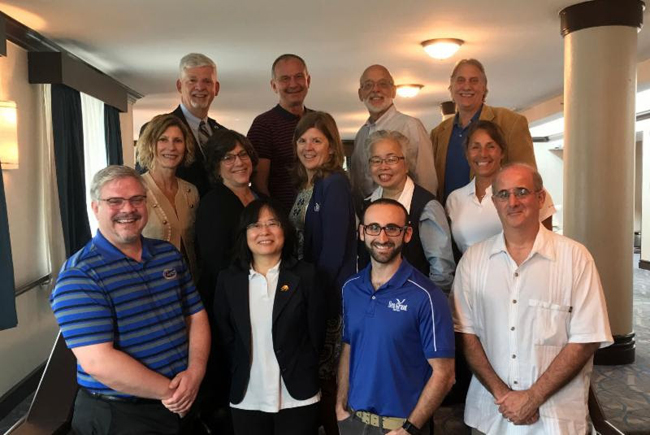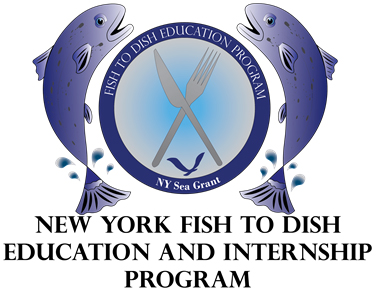Research will be conducted in partnership with NOAA Sea Grant programs around the country
Contacts:
Monica Allen, NOAA Research, Media Relations, E: monica.allen@noaa.gov, P: 301-734-1123
Michael Ciaramella, NYSG Seafood Safety Specialist, E: mc2544@cornell.edu, P: 631-632-8730

Jon Pennock (top row, first from left) joined the Seafood HACCP Alliance steering committee for a portion of their annual meeting in Annapolis this month. Sea Grant has a long and active partnership with the Seafood HACCP Alliance. Many Sea Grant professionals serve on the Alliance's steering committee and are pictured here, including NYSG's Seafood Specialist Michael Ciaramella (bottom row, third from left) and NYSG's former (retired) Seafood Specialist Ken Gall (top row, second from left).
Washington, DC, October 31, 2017 - The National Oceanic and Atmospheric Administration (NOAA) announces 32 research grants totaling $9.3 million for projects around the country to further develop the nation’s marine and coastal aquaculture industry.
“This country, with its abundant coastline, should not have to import billions of pounds of seafood each year,” said Secretary of Commerce Wilbur Ross. “These grants will promote aquaculture projects that will help us reduce our trade deficit in this key industry.”
The grants were awarded through two competitions to help spur the development and growth of shellfish, finfish, and seaweed aquaculture businesses. The projects include basic and applied research to improve efficient production of seafood, permitting of new businesses, management of environmental health issues, and economic success of aquaculture businesses.
“Public-private partnerships play a vital role in advancing sustainable domestic aquaculture and increasing food security,” said Jonathan Pennock, director of NOAA Sea Grant. “Industry is working alongside researchers on each of these projects, which will help expand businesses, create new jobs and provide economic benefits to coastal communities.”
All projects include public-private partnerships and will be led by university-based NOAA Sea Grant programs. With each project, every two dollars of federal funding is matched by one dollar of non-federal funds, bringing the total investment in these research projects to more than $13.9 million.
 In New York, a $100,000+ grant supports "Securing the Future of Seafood through Industry and Education," a Fish-to-Dish collaborative internship program that will introduce students to an industry with exceptional growth potential and empower students to pursue careers in seafood science and aquaculture.
In New York, a $100,000+ grant supports "Securing the Future of Seafood through Industry and Education," a Fish-to-Dish collaborative internship program that will introduce students to an industry with exceptional growth potential and empower students to pursue careers in seafood science and aquaculture.
"This program helps us to meet a serious need in addressing the lack of seafood and aquaculture specific education programs," says New York Sea Grant Seafood Specialist Michael Ciaramella.
The program will provide direct industry support, with interns housed at industry partners during busy summer months. The interns selected for the program will receive hands-on training in their assigned sector of the seafood and aquaculture industry and obtain a Fish to Dish education on the industry as a whole.
"Our aim is to aid in the development of a skilled student workforce capable of advancing and working in the industry in the future," says Ciaramella. He cites that there is a lack of formal training surrounding seafood and aquaculture throughout the country, which limits potential for growth. "Without a steady flow of skilled seafood and aquaculture professionals, the industry will have a difficult time continuing to advance and increase production, which will result in heavy reliance on foreign imports."
At the heart of internships is interest in raising the public profile of seafood, a nutritious protein source that imparts many health benefits to those consuming it. "Growing populations and increased awareness of the health benefits of seafood has resulted in a increased demand for such products globally," says Ciaramella.
However, studies show that more than 90% of wild fish stocks are either overfished or fished at or close to sustainable limits. Thus, farm-raised seafood plays an increasing role in meeting the growing demand. "In order to continue advancing the industry and increase production of domestic seafood," says Ciaramella, "it is important to educate burgeoning generations on current and future seafood farming and processing technology/practices."
Congressman Lee Zeldin (R, NY-1), co-chair of the bipartisan Long Island Sound Caucus and member of the Congressional Shellfish Caucus says, “I am proud of this federal funding secured for New York Sea Grant, a crucial program that provides resources to our local anglers and businesses, which will be used to support this vital industry and help preserve our cherished tradition of saltwater fishing. Here on Long Island, fishing is a treasured part of our life, culture, and economy. With imported seafood making up 90% of American seafood consumption, ensuring Long Island’s fishermen and shellfish farmers have access to the resources needed to sustain and grow their businesses is more critical than ever to keep seafood jobs on Long Island and to help the industry grow.”
"New York's aquaculture industry is going through a growth spurt, especially commercial shellfish aquaculture on Long Island," says William Wise, Director of New York Sea Grant. "To sustain this grow, the industry will need access to a workforce of young, well-trained seafood and aquaculture production professionals. The internship program to be organized by New York Sea Grant with the awarded funds will ensure that this cadre of new workers is there when the industry needs them."
Sea Grant’s investment in aquaculture research, outreach and education programs continues to produce results for coastal communities and their economies. Between February 2016 and January 2017, Sea Grant invested $9 million in aquaculture research, technology transfer, and outreach and reported $90 million in economic impacts, including support of 900 businesses and 1,800 jobs.
For a full list and short descriptions of the 32 grant projects, visit the NOAA Sea Grant Web site.
More Info: New York Sea Grant
New York Sea Grant (NYSG), a cooperative program of Cornell University
and the State University of New York (SUNY), is one of 33 university-based
programs under the National Oceanic and Atmospheric Administration’s
National Sea Grant College Program.
Since 1971, NYSG has represented a statewide network of integrated
research, education and extension services promoting coastal community
economic vitality, environmental sustainability and citizen awareness
and understanding about the State’s marine and Great Lakes resources.
Through NYSG’s efforts, the combined talents of university scientists
and extension specialists help develop and transfer science-based
information to many coastal user groups—businesses and industries,
federal, state and local government decision-makers and agency managers,
educators, the media and the interested public.
The program maintains Great Lakes offices at Cornell University, SUNY
Buffalo, SUNY Oswego and the Wayne County Cooperative Extension office
in Newark. In the State's marine waters, NYSG has offices at Stony Brook
University in Long Island, Brooklyn College and Cornell Cooperative
Extension in NYC and Kingston in the Hudson Valley.
For updates on Sea Grant activities: www.nyseagrant.org has RSS, Facebook, Twitter, and YouTube links. NYSG produces a monthly e-newsletter, "NOAA Sea Grant's Social Media Review," via its blog, www.nyseagrant.org/blog. Our program also offers a free e-list sign up via www.nyseagrant.org/coastlines for its flagship publication, NY Coastlines/Currents, which is published quarterly.